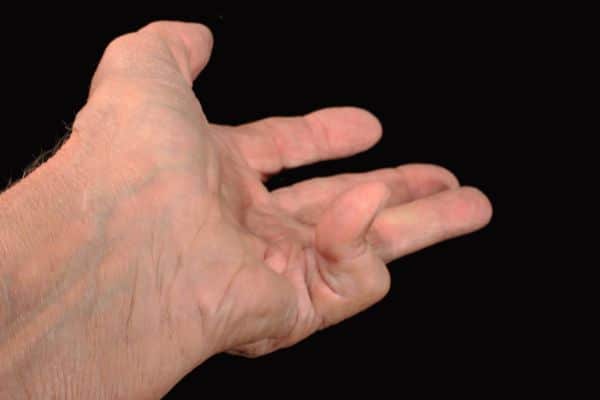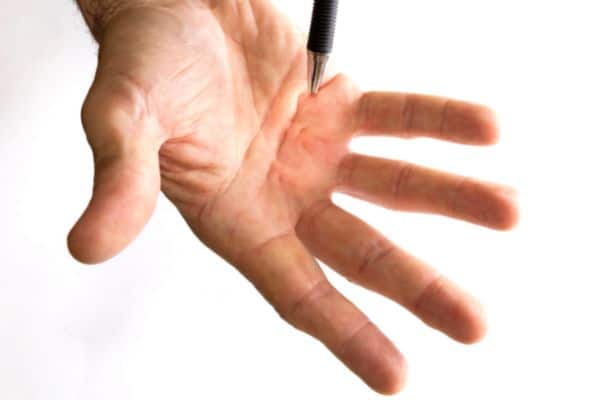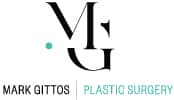Dupuytren’s disease or contracture – Hand Surgery in Auckland New Zealand

Dupuytren’s disease or contracture is a type of hand deformity where the tissue underlying the skin of the palm clumps together and contracts, pulling one or more fingers toward the palm.
People who have these contractures cannot completely straighten their fingers, which would make certain hand gestures involved in shaking hands or putting them in your pocket problematic.
Dupuytren’s disease is most frequently seen in older men and it more commonly affects the ring and little finger. Several treatments are available including hand surgery.
What are the symptoms of Dupuytren’s contracture?
Dupuytren’s disease is a slowly progressing disease. As the tissue of your palm clumps together, it starts to feel like a nodule or a hard lump of tissue under the skin. This is what’s called a “contracture”, and it is usually painless.
The tissue becomes progressively tighter and forms into a cord extending along the palm to your fingers and bending them. As the cord tightens, it pulls the fingers closer to your palm.
Both hands can be affected by Dupuytren’s contracture, however, one hand is usually more affected than the other. The contractures can complicate simple hand gestures, such as those performed when washing your hands, shaking someone’s hand, or even putting your hands in your pocket.
What causes Dupuytren’s disease?
Researchers still don’t know what exactly causes this condition, however, they have identified some factors that may increase your risk of developing it:
- Male sex
- Age between 40 and 60
- Northern European ancestry
- Family history of Dupuytren’s contracture
- Smoking
- Drinking alcohol
- Diabetes
There’s still no evidence that overusing your hands or flexing them in repetitive motions or certain positions increases your risk of developing Dupuytren’s disease.
How is Dupuytren’s contracture diagnosed?

Dr. Gittos will start by inspecting the affected hand to see if its posture is abnormal. Then, they will palpate it to try and feel the nodule or cord. She will repeat the same process with the other hand, and compare the two to each other. You might be asked to put your hand flat on a table to test if you can do it. If your hand is not completely flat, you’re likely to have Dupuytren’s contracture. Dr. Gittos might also take measurements of your hand and how far your fingers are to know how quickly the disease is progressing.
Diagnosis can usually be established by physical examination alone without needing any special testing.
Dupuytren’s contracture is not a common disease. If you have it, you don’t have to worry, as there are several ways to deal with the hand deformity it produces. You can call us to learn more, or come visit and get a full assessment of your condition. Dr. Gittos has great experience in treating hand deformities, and he would be happy to meet you to discuss surgical and non-surgical treatment options.
How is Dupuytren’s disease treated?
Treatment might not be started until Dupuytren’s contracture starts affecting your ability to perform daily tasks. You need to know that there is no definitive cure for this disease, however, several treatment options are effective in dealing with the resulting deformity. All treatment methods work by breaking the clumped-up tight tissue, freeing the fingers from its pull.

Treatment options for Dupuytren’s Disease
1. Home Treatments
Here are a few things you could do at home to protect your hands and maybe improve your Dupuytren’s contracture
- Finger stretching
- Applying massage and heat to release the tightened tissue
- Wearing gloves to protect your palms
- Avoiding tight grips when using handheld devices
2. Needling
A Doctor or therapist uses a small needle to puncture your skin and break down the contracted tissue, releasing your fingers to regain their full range of motion. The disadvantages of needling are that contractures tend to recur when treated with this technique and that it can’t be applied to some areas of the hand where nerves and vessels pass.
The advantage is that needling requires no surgical skin incision and no (or minimal) physical therapy for recovery.
3. Enzyme injections
Certain enzymes (called collagenases) can dissolve the tissue forming the contracture cord and release the fingers. The procedure can be done in a clinic or hospital on an outpatient basis and requires minimal recovery time. The downside is that these enzymes can only be injected into one joint in each session, and the sessions need to be at least 1 month apart, which translates to a long treatment course. Recurrence is common with this treatment method.
4. Dupuytren’s Syndrome Hand Surgery treatment
If your Dupuytren’s contracture has progressed to a stage where the cord is easily palpable, Dr Gittos might recommend surgery. The surgical procedure requires advanced skills and experience in treating hand deformities so that only the contracted tissue is removed while normal tissue is spared.
The great thing about surgery is that it provides a permanent solution. The main disadvantage of surgery is that you’ll require more time to recover. Your doctor will also likely recommend several months of physical therapy to restore your hand’s full function.
Uncommonly, in some severe cases, the surgeon might remove an extensive amount of involved tissue, including the overlying skin. If this happens, a skin graft might be required to close the defect.
Recovery after Hand Surgery

Dr Gittos has developed a wealth of knowledge, experience and skill in the complex field of hand surgery. Working closely with hand therapists and other professionals, our aims are clear: to restore function and wherever possible, to enhance appearance as well.
Further Reading – Medical Sources:
- UpToDate article on Dupuytren’s contracture
- PubMed article on Dupuytren’s disease: diagnosis and treatment
- American Society for Surgery of the Hand on Dupuytren’s Contracture
- American Academy of Orthopaedic Surgeons on Dupuytren’s Disease
Complications and Risks of Hand Surgery for Dupuytrens
Hand surgery incurs risks and complications like all invasive surgery. Your Surgeon will make you aware of potential complications during your consultation. This includes general anaesthesia, bleeding (Haematoma), infection, wound healing, deep vein thrombosis, scarring and numbness. Always stay informed and healthy, do not smoke before or after your procedure and read and understand your risks.
Dupuytrens Disease Hand Surgery Price & Fees – How much does Hand Surgery Cost?
All Hand Surgery is customised and your Surgeon will give you a price for surgery depending on the type of procedure you are having, the clinic or hospital you attend and the length of your stay.
After your initial consultation, you will be given a detailed quote. This will include a Surgeon’s fee, Anaesthetic fee, and theatre fees. We can also provide information on Tummy Tuck Health Insurance and different methods of payment.
Choosing a Hand Surgeon in Auckland
It is important to research your Surgeon’s qualifications and experience before deciding on your Surgeon. Make sure you feel comfortable with your surgeon.
Why Choose Dr Mark Gittos Plastic Surgeon?
Not all Surgeons have the same experience or intensive training and testing qualifications. Be sure you learn the differences between a Plastic Surgeon, a General Surgeon, Cosmetic Surgeon or other types of Surgeon.
Dr Mark Gittos is a highly experienced, fully qualified specialist plastic surgeon with current FRACS memberships.
About Dr Mark Gittos FRACS (Plast) – New Zealand Plastic Surgeon
Practice locations in Herne Bay Auckland, Northland and Bay of Plenty – Kerikeri, Whangarei, New Plymouth & Tauranga
Dr Mark Gittos is a leading Specialist Plastic Surgeon and operates a practice in Herne Bay, Auckland and in the UK. The practice focuses on both surgical and non-surgical procedures, each designed to help restore, improve or change a physical characteristic or problem. The first step in every case is to talk through your personal requirements and explore all the options, before deciding on the most effective solution.
Dr Mark Gittos offers high quality, natural-looking cosmetic surgery results and is highly experienced in Breast, Body and Face Surgery having performed over 4000 Surgeries in the last 26 years. With worldwide expertise Dr Gittos is an expert in breast, face and body surgery for men & women.
Naturally, before any treatment is begun, we will explain clearly the advantages and risk factors; so that you have the information you need to make an informed decision that is best for you. Visit the practice to find out more.

NEXT STEPS
Please NOTE: Dr Gittos only performs surgery on non-smoker patients with a BMI less than 30. To check your BMI please visit the NZ Heart Foundation website. For help giving up smoking before surgery visit the Smoke Free website
Do your Research
- Read the Website and Blogs relevant to your procedure
- Browse our Frequently Asked Questions including how to choose a Surgeon for your procedure
- Download and read the FREE Guides to Surgery
What to Bring to your Plastic Surgeon Consultation
- Bring a friend or relative to help discuss the information and your choices
- Take lots of notes and read the documents provided thoroughly
- Dress in simple clothes as you may need to undress for examination
- Bring your medical referral and any relevant medical documents or test results
Book your Initial Surgery Consultation
- A Referral from your GP or specialist is helpful but NOT essential – you can have a consultation without a GP Referral
- Email us or Call on 09 529 5352 to arrange your surgeon consultation appointment.
- Book a consultation with Dr Gittos by paying the Consultation Fee – $350 incl GST
Traveling for Surgery? – Consider post-surgery luxury recovery in a Hotel with LuxeCare
Please contact us to arrange to book a consultation with our Specialist Plastic Surgeon or to speak with our Patient Care Advisor.
Send an enquiry form today or phone 09 529 5352 during Clinic Hours
